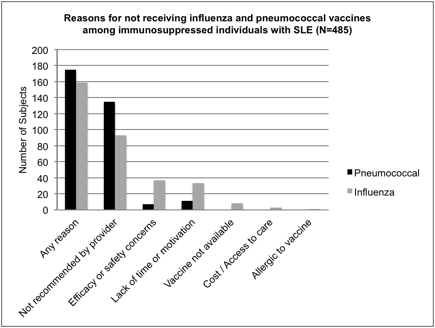Session Information
Session Type: Abstract Submissions (ACR)
Background/Purpose: Infection is the third-leading cause of death in individuals with systemic lupus erythematosus (SLE) in developed countries. Nearly half of those deaths are attributed to pneumonia, making vaccination against influenza and pneumococcus critical to prevention of mortality. Nonetheless, previous work has shown that a significant number of SLE patients fail to receive these vaccinations (Yazdany, 2010). The goal of this study was to better understand why individuals with SLE fail to receive influenza and pneumococcal vaccines.
Methods: Data derive from the 2009 cycle of the Lupus Outcomes Study (LOS), an annual longitudinal telephone survey of individuals with confirmed SLE. Subjects were included in the analysis if they had taken immunosuppressive medications in the past year and reported whether they had received influenza and pneumococcal vaccines. We assessed any prior receipt of pneumococcal vaccine and receipt of influenza vaccine in the past year. Subjects who did not receive a vaccine were asked whether their physician had recommended it. If the vaccine was recommended but not received, subjects were given itemized response options to elicit reasons for not receiving vaccination. We used bivariate statistics and logistic regression (adjusting for age, gender, race, insurance status, and physician specialty) to assess frequency and predictors of reported reasons for not obtaining influenza or pneumococcal vaccines.
Results: Among 508 subjects who received immunosuppressive medications, 485 reported whether they had received vaccines. Mean age (±SD) was 50 years (±12), 93% were female, and 40% were non-white. Nearly all had insurance coverage: 53% through employers, 40% with Medicare and 5% with Medicaid. Among subjects who did not receive the influenza vaccine (N=175), the most common reason was lack of doctor recommendation (45%), followed by efficacy or safety concerns (21%), and lack of time or motivation to obtain the vaccine (19%). Reasons for not receiving the pneumococcal vaccine (N=159) were similar, with lack of doctor recommendation the most common (85%), followed by lack of time (7%) and efficacy or safety concerns (4%). Subjects age 65 or older were more likely to receive a recommendation for pneumococcal vaccine than younger subjects (43% vs. 11%, p=0.02). Multivariate models to assess predictors of vaccine recommendation were not statistically significant.
Conclusion: The most common reason why individuals with SLE did not receive pneumococcal and influenza vaccines was that physicians failed to recommend them, follwed by concerns about safety and efficacy of vaccines and time constraints. Physicians were more likely to recommend pneumococcal vaccination for older subjects. Data suggest that increasing vaccination rates in SLE will require improved process quality at the provider level, as well as addressing patient concerns and barriers.
Disclosure:
E. F. Lawson,
None;
L. Trupin,
None;
E. von Scheven,
None;
E. H. Yelin,
None;
J. Yazdany,
None.
« Back to 2013 ACR/ARHP Annual Meeting
ACR Meeting Abstracts - https://acrabstracts.org/abstract/reasons-for-failure-to-obtain-influenza-and-pneumococcal-vaccines-among-immunosuppressed-individuals-with-systemic-lupus-erythematosus/

